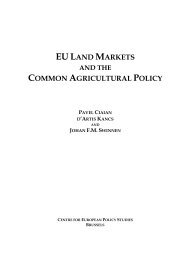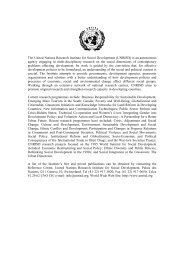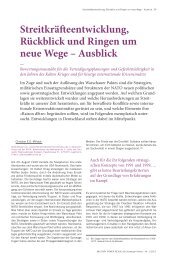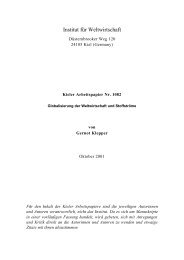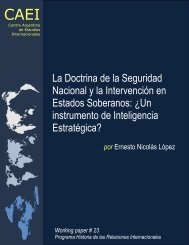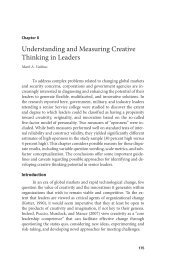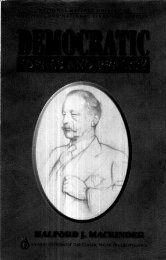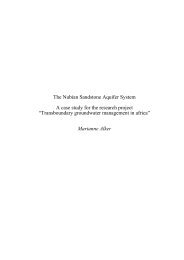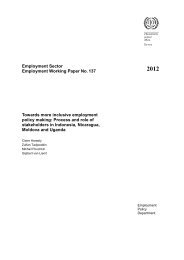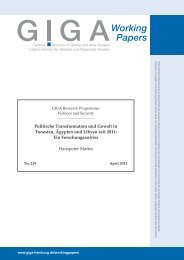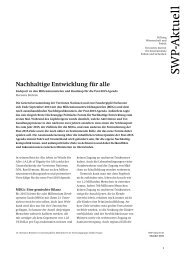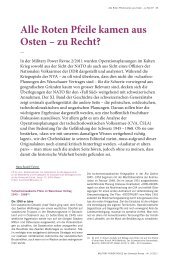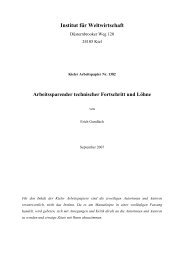A Postcolonial-Feminist Alternative to Neoliberal Self/Other Relations
A Postcolonial-Feminist Alternative to Neoliberal Self/Other Relations
A Postcolonial-Feminist Alternative to Neoliberal Self/Other Relations
Create successful ePaper yourself
Turn your PDF publications into a flip-book with our unique Google optimized e-Paper software.
‘conversion/discipline’ in a larger context so that other options for interactions and<br />
negotiations could be considered. An analytical framework that grants agency <strong>to</strong> the<br />
<strong>Other</strong>, whether women or other subalterns, also obsolesces colonial power relations<br />
expressed through hypermasculine whiteness or any other entitlement <strong>to</strong> superiority.<br />
Racial divides dissipate when we interrogate their social constructions (e.g., what is<br />
‘whiteness’?) based on structures of power where a small minority relies on the majority<br />
for labor, resources, and sustenance (e.g., who’s really in charge and why?). The<br />
Buddhist notion of ‘I in you and you in me’ teaches, in contrast, that the <strong>Self</strong> exists in the<br />
<strong>Other</strong> as much as the <strong>Other</strong> is in the <strong>Self</strong>, underscoring Edward Said’s call for a<br />
contrapuntal method. Seeking <strong>to</strong> convert or discipline the <strong>Other</strong>, as in the ‘failed’ Asian<br />
economies or recalcitrant Iraqi insurgents, would be tantamount <strong>to</strong> doing the same <strong>to</strong> the<br />
triumphant, occupying <strong>Self</strong>. The violence would not be contained ‘out there;’ it would<br />
resound ‘in here’ as well, 13 given the mutual complicities that enabled each. We see this<br />
happening as Asian capitalists and Muslim insurgents alike vow <strong>to</strong> avenge themselves on<br />
the West. More than ever, we need a poetics of life <strong>to</strong> help us place ‘the Coke side of<br />
life’ in perspective. We can and should enjoy material comforts and pleasures but<br />
without being reduced <strong>to</strong> a slavish, reactionary hypermasculinity, whether founded on<br />
whiteness or corporate virtue or any other assigned identities.<br />
Shifting conceptually from ‘borders’ <strong>to</strong> ‘borderlands’ is not easy. Old ways of<br />
thinking remain entrenched despite the fact that peoples and societies have been living,<br />
working, and thriving on the borderlands for centuries. But it’s time <strong>to</strong> match our<br />
concepts with our realities.<br />
REFERENCES<br />
Addario, L. 2001. Jihad’s Women. New York Times Magazine. 21 Oc<strong>to</strong>ber: 38-41.<br />
Agathangelou, Anna M. and Ling, L.H.M. forthcoming. Transforming World Politics:<br />
from Empire <strong>to</strong> Multiple Worlds. London: Routledge.<br />
13 Note, for instance, the damage done <strong>to</strong> US soldiers in Iraq suffering from post-traumatic stress<br />
syndrome (PTSD) (Rubin 2008), let alone the generations of Iraqis and Afghans affected by the<br />
US occupation of their respective countries.<br />
19



